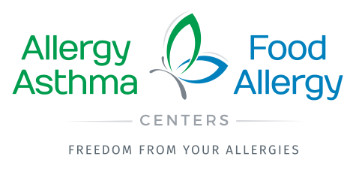Here are some of the most commonly asked questions about allergy shots. Contact our office with any additional questions you may have. Scroll down to see the most current calendar of available injection times. If you are an established patient interested in starting allergy shots, please download the Allergen Immunotherapy Treatment Consent and Immunotherapy Financial Consent Authorization forms as well as the Cluster Immunotherapy Information. Fill out the two consent forms and return them to us via fax at 314-849-8737 or email them to info@aafacenters.com. If emailing them, please put “allergy shot consent forms” in the subject line.
How do allergy shots work?
An allergy is when your immune system mistakes a harmless substance for a dangerous one and triggers the release of chemicals into your body, thus creating symptoms like runny nose, sneezing, watery eyes, itching and in some cases, more serious symptoms like coughing or wheezing, swelling of the throat and tongue, and in the worst case anaphylaxis.
Allergy shots increase your tolerance to the harmful allergen. By injecting gradually increasing doses of the offending allergen extract, the immune system builds up a tolerance to that allergen so that it is no longer seen as a threat to your body. Allergy shots slow down and reduce the production of the IgE antibody. You can think of each shot as adding a brick to the “wall of protection” against things that trigger your allergies.
Who are the best candidates for allergy shots?
If you are able to avoid the trigger of your allergies or if usual doses of medications control your symptoms, then immunotherapy might not be needed. While allergy shots have been proven effective against inhalant allergies and stinging insect allergies, they are not used for food allergies. If any of the following applies to you, then you may be a candidate for allergy shots:
- If the medications to control your symptoms (i.e., antihistamines, decongestants) do not work.
- If the medication used to control your symptoms produces too many side effects.
- If complications (i.e., sinus infections, ear infections) develop.
- If you have asthma triggered by allergies.
- If you are at risk of developing anaphylaxis (a severe reaction that, in some cases, may be fatal) when exposed to an allergen, such as a stinging insect. (As noted above – allergy shots are not used for food allergy.)
- If medications control your symptoms, but your symptoms flare back up every time you try to reduce your medications.
- If you can’t effectively avoid things that trigger your allergies.
- If you would rather take a series of allergy shots than daily medications.
- If you would rather treat the actual problem rather than just use medications to control symptoms. Allergy shots are the only potential cure that is FDA approved.
- If cost of the medications is a burden, allergy shots are very cost effective compared to the use of daily prescription medications over several years.
How often do I need shots?
Allergy shots are typically started on a weekly schedule during the build-up phase. Alternatively, some people elect to undergo an accelerated schedule called cluster immunotherapy to achieve the benefits of injections more quickly. You can read more about cluster immunotherapy in our Cluster Immunotherapy Information sheet. Symptomatic improvement may occur within the first 3-6 months with full benefit usually seen with the first 12-18 months.
After a maintenance dose is reached, your allergist will determine when to decrease the interval between shots (for example, every 2 weeks, every 3 weeks, every 4 weeks). This usually occurs at 6 to 12 month intervals but is also affected by how your allergy symptoms are responding to treatment. Most people will be able to stop their injections after about 3 to 5 years.
Board-certified allergists are specially trained to safely utilize potent allergy extracts which are more complicated to use, but which provide significantly greater benefit than the low-dose allergy extracts used by physicians not specifically trained in the sub-specialty of Allergy/Immunology. You should always consult with a Board Certified Allergist before beginning a program of allergy shots.
Are allergy shots expensive?
The out of pocket cost will depend on the individual’s insurance policy. Studies have shown that allergy shots are a very cost-effective way to treat allergies. They have been shown to reduce medication requirements and improve the quality of life in those patients who take them. They are the only long-term way to bring symptoms under control in those patients who have significant allergic disease.
I have heard of other types of allergy treatments different from allergy injections. Do you offer them and why not?
Allergy injections are the standard of care from The American Academy of Allergy and Immunology. Other treatment modalities, such as sublingual immunotherapy are FDA approved only for grass and ragweed pollens (not tree pollens, other weed pollens, molds, cat, dog, or house dust mites). Other sublingual drops are not approved by the FDA for immunotherapy but can be effective, though less so than allergy injections.
Why do I have a large bump on my arm where my allergy injection was given?
A large local reaction does not mean a patient is having a systemic reaction. It can be comforted with ice, ibuprofen, acetaminophen or Benadryl and should be reported to the nurse the next time you are in for an injection. It does not require further treatment and it is not necessary to call the on call Doctor after hours to be reported.
Calendar
The injection calendar page shows available injection times for our locations. You do not need to make an appointment ahead of time. For safety, all patients must wait 30 minutes after receiving injections.
